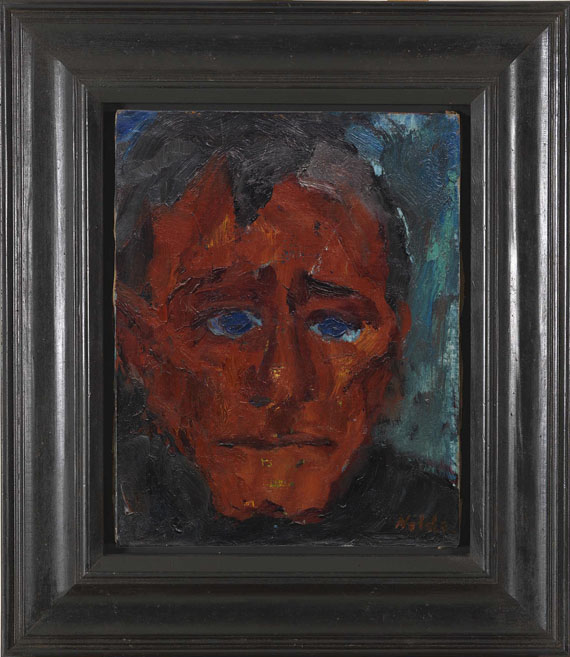Frame image
458
Emil Nolde
Peter P, 1918.
Oil on canvas
Estimate:
€ 80,000 / $ 92,800 Sold:
€ 125,000 / $ 145,000 (incl. surcharge)
458
Emil Nolde
Peter P, 1918.
Oil on canvas
Estimate:
€ 80,000 / $ 92,800 Sold:
€ 125,000 / $ 145,000 (incl. surcharge)
Peter P. 1918.
Oil on canvas.
Urban 784. Lower right signed. Once more signed on the reverse and titled, as well as inscribed "erworben 18.7.19" by a hand other than that of the artist. 40.7 x 33 cm (16 x 12.9 in).
Verso with the oil sketch "Weibliche Figur hinter einem Wandschirm".
• The portrait is particularly captivating for its expressive coloring.
• Emil Nolde does not just paint heads, he paints types.
• The artist captures his vis-à-vis with an immediacy of expression, unfiltered and intuitive.
PROVENANCE: Franz Kochmann (1872-1956) Dresden/Utrecht (July 18, 1919, with the ownership entry and the acquisition date on the reverse, until at least 1946. Stored at Gemeentemuseum The Hague 1941-1946, returned to Kochmann omn May 2, 1946).
Galerie Theo Hill, Cologne.
Adolf Funke, Aachen (acquired from the above in 1956).
Private collection West Germany (until 1999: Lempertz November 13, 1999).
Private collection Southern Germany (until 2014: Ketterer December 5, 2014).
Private collection Lower Saxony (acquired from the above).
EXHIBITION: Künstlervereinigung Dresden, Summer Exhibition, Dresden 1919, cat. no. 98.
LITERATURE: Lempertz, Cologne, auction 779, November 13, 1999, lot 1189 (with illu.).
Ketterer Kunst, Munich, auction 419, December 5, 2014, lot 347 (with illu.).
Oil on canvas.
Urban 784. Lower right signed. Once more signed on the reverse and titled, as well as inscribed "erworben 18.7.19" by a hand other than that of the artist. 40.7 x 33 cm (16 x 12.9 in).
Verso with the oil sketch "Weibliche Figur hinter einem Wandschirm".
• The portrait is particularly captivating for its expressive coloring.
• Emil Nolde does not just paint heads, he paints types.
• The artist captures his vis-à-vis with an immediacy of expression, unfiltered and intuitive.
PROVENANCE: Franz Kochmann (1872-1956) Dresden/Utrecht (July 18, 1919, with the ownership entry and the acquisition date on the reverse, until at least 1946. Stored at Gemeentemuseum The Hague 1941-1946, returned to Kochmann omn May 2, 1946).
Galerie Theo Hill, Cologne.
Adolf Funke, Aachen (acquired from the above in 1956).
Private collection West Germany (until 1999: Lempertz November 13, 1999).
Private collection Southern Germany (until 2014: Ketterer December 5, 2014).
Private collection Lower Saxony (acquired from the above).
EXHIBITION: Künstlervereinigung Dresden, Summer Exhibition, Dresden 1919, cat. no. 98.
LITERATURE: Lempertz, Cologne, auction 779, November 13, 1999, lot 1189 (with illu.).
Ketterer Kunst, Munich, auction 419, December 5, 2014, lot 347 (with illu.).
In the portrait painting of "Peter P", Emil Nolde does not so much trace the pictorial closeness of his counterpart, but rather seeks to capture his overall appearance in the effect on himself. Nolde gives the painting a remarkable and unique presence. In addition to oil painting, watercolors occupy a special rank in the painter's oeuvre, and he also held the portrait genre in high esteem throughout his life. The son of a Northern German farmer, Emil Hansen was born in the German-Danish borderland in 1867. After an apprenticeship as a furniture draftsman and woodcarver in Flensburg from 1884 to 1888, and a subsequent apprenticeship in commercial drawing in St. Gallen, he was drawn back to the countryside after stints in Berlin. He became preoccupied with the rural population and produced drawings of the local mountain farmers as early as in Switzerland in the 1890s. Meanwhile settled on the North Sea coast, Nolde again took up the theme of rural life and created the striking portrait of a young. Details about the sitter remain unknown, but it is probably a farmer from the surrounding countryside. A certain shyness and skepticism in the facial expression of Peter P is not to be overlooked, which may be due to a certain distance, which the sitter brought to the painter. Even if they shared the same roots, the painter Emil Nolde appeared somewhat exotic in the eyes of the peasants. His expressive-empathic painting style probably contributed to the distance between them and the eccentric painter. Thus, the sitter is less to be classified as an individual, but stands, in an extended understanding, for a simple life in the country, of which Nolde was also quite fond. With his wife Ada, for example, he planted a farm garden in Seebüll, and his home became a recurring subject in his painting, especially in the course of the late 1910s and 1920s. Nolde's rejection of a professorship at the Academy of Fine Arts in Karlsruhe in 1918, the year the present work was made, also underscores the importance of this subject area for Nolde. The expressive and fresh colors of the painting are also particularly noteworthy. The reddish brown of the face is dominated by a almost unreal blue eyes, which are echoed by the amorphous blue of the background. A triad of expression, color, and form becomes an eventful overall concept in the small portrait, which in its effect draws entirely on the canon of Noldean interpretations. [KD/AW]
Headquarters
Joseph-Wild-Str. 18
81829 Munich
Phone: +49 89 55 244-0
Fax: +49 89 55 244-177
info@kettererkunst.de
Louisa von Saucken / Undine Schleifer
Holstenwall 5
20355 Hamburg
Phone: +49 40 37 49 61-0
Fax: +49 40 37 49 61-66
infohamburg@kettererkunst.de
Dr. Simone Wiechers / Nane Schlage
Fasanenstr. 70
10719 Berlin
Phone: +49 30 88 67 53-63
Fax: +49 30 88 67 56-43
infoberlin@kettererkunst.de
Cordula Lichtenberg
Gertrudenstraße 24-28
50667 Cologne
Phone: +49 221 510 908-15
infokoeln@kettererkunst.de
Hessen
Rhineland-Palatinate
Miriam Heß
Phone: +49 62 21 58 80-038
Fax: +49 62 21 58 80-595
infoheidelberg@kettererkunst.de
We will inform you in time.





